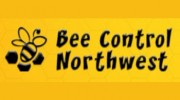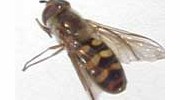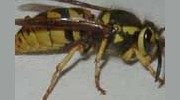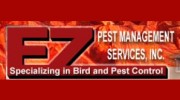 Bill Ruhl Jr. started as a hobby beekeeper with his father in 1962. His father bought a beekeeping supply business in 1970 & when Bill got out of the army he helped manage the family business. The business was doing very well; however, they were always getting calls from people who needed bees exterminated from their homes.
Bill Ruhl Jr. started as a hobby beekeeper with his father in 1962. His father bought a beekeeping supply business in 1970 & when Bill got out of the army he helped manage the family business. The business was doing very well; however, they were always getting calls from people who needed bees exterminated from their homes.In 1974 Bill got his pest control license & started helping those he could. By 1975 he was so busy doing exterminating that he stopped working at Ruhl Bee Supply & started Bee Control NW. Now, after 40 years of working with bees, Bill is still the only one that specializes in just bees & wasps in the Portland metro area. He enjoys the exterminating end of the business & is joined by his wife, Jane, & son, Kelly, in the office.
Highlights and features
- Bees, Hornets, Wasps, Yellowjackets
Bumble Bees
Report
Solitary Bees
Report
 As the name says, they are solitary; they don't live in large colonies like other bees. They live in pairs, male and female. They use small holes, sometimes in the ground or wall of your house, to lay their eggs in. Each pair will have their own hole, however, they are often found in close proximity to each other. It's not uncommon to have dozens of holes being used in one area. Some ground holes will have mounds of dirt around them & others will not.
As the name says, they are solitary; they don't live in large colonies like other bees. They live in pairs, male and female. They use small holes, sometimes in the ground or wall of your house, to lay their eggs in. Each pair will have their own hole, however, they are often found in close proximity to each other. It's not uncommon to have dozens of holes being used in one area. Some ground holes will have mounds of dirt around them & others will not. Yellow Jackets and Hornets
Report
 There are about twelve different species of yellow jackets in the Portland Metro area. Some are called hornets. They are a type of aerial nesting yellow jacket. Its nest visibly hangs in the air on a bush, tree, under the eaves of your house, or someplace similar. Their colors may vary. The bald-faced hornet is black & white, as opposed to black & yellow.
There are about twelve different species of yellow jackets in the Portland Metro area. Some are called hornets. They are a type of aerial nesting yellow jacket. Its nest visibly hangs in the air on a bush, tree, under the eaves of your house, or someplace similar. Their colors may vary. The bald-faced hornet is black & white, as opposed to black & yellow. Wood Wasps
Report

Be the first to review Bee Control Northwest.
Write a Review There are several species of bumblebees & they don't all look exactly the same. Some are small, some are large, & some also have orange coloring on them. Bumblebees are similar to honeybees in that they pollinate & collect nectar, but they do not make honey.
There are several species of bumblebees & they don't all look exactly the same. Some are small, some are large, & some also have orange coloring on them. Bumblebees are similar to honeybees in that they pollinate & collect nectar, but they do not make honey.  The wood wasp bores a hole into a live tree to lay its eggs. The next spring those eggs hatch. Sometimes man comes along & cuts down the tree in the mean time. If the eggs are not destroyed in the drying & milling process your house can be made of this wood.
The wood wasp bores a hole into a live tree to lay its eggs. The next spring those eggs hatch. Sometimes man comes along & cuts down the tree in the mean time. If the eggs are not destroyed in the drying & milling process your house can be made of this wood. 




